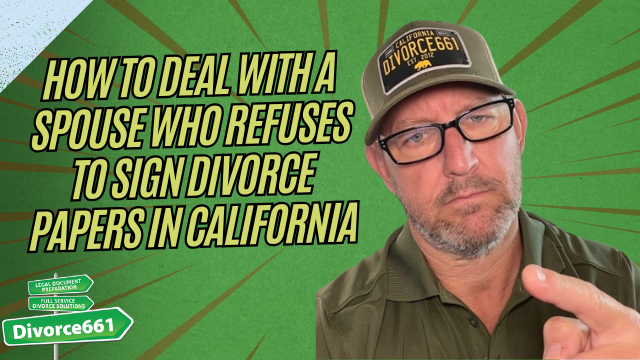How to Deal with a Spouse Who Refuses to Sign Divorce Papers in California
One of the most frustrating parts of divorce is when a spouse refuses to sign the papers. You may feel stuck, powerless, or unsure how to move forward. The good news is that in California you do not need your spouse’s permission to get divorced. Understanding the process and the options available will let you keep the case moving even when the other side will not cooperate.
California is a No Fault Divorce State
California follows no fault divorce rules. That means you do not need the other spouse to agree to the divorce or to sign any documents for the case to proceed. Filing the petition and properly serving the other party starts the process. If your spouse ignores the case after being served, the law provides a path to finalize the divorce without their participation.
Service and the 30-Day Response Period
Proper service of the divorce papers is essential. Once a spouse has been properly served, they have 30 days to file a response. If they do not respond within that 30-day window, you can request a default judgment from the court.
- File and serve the petition according to the court rules.
- Wait 30 days after proper service for a response from the other spouse.
- If no response, prepare and submit the default paperwork to the court.
What Is a Default Judgment?
A default judgment is the court’s way of finalizing the case when the other party does not participate. It allows the court to grant the divorce and resolve the issues in the case without the spouse’s signature or cooperation. The court will review the paperwork you submit and, if everything is in order, issue the judgment that legally ends the marriage.
Important points about default judgments
- The court will expect proper forms and supporting documents that address the issues in the case, such as property division, debts, and any orders related to children or support.
- Everything must follow court rules to avoid delays or rejection of the default request.
- Default is a common and legitimate path when a spouse chooses to ignore the case.
Real Example: Finalizing a Divorce Without Cooperation
Clients often ask whether the court will really grant a divorce if the other side does not participate. In one recent matter, after filing and serving the documents, the responding spouse ignored the entire case. We waited the required 30 days, submitted the default judgment, and the court granted the divorce. No signature, no cooperation, and the client was able to move forward.
After we filed and served the documents, we waited the required 30 days, then submitted the default judgment. The court granted the divorce and our client was able to move on.
How to Handle an Uncooperative Spouse the Right Way
Even though you can move forward without the other spouse, it is important to follow the rules precisely. Mistakes in service or in the default paperwork are common reasons for delay. Here are the practical steps to keep your case on track:
- Confirm proper service was completed and documented.
- Keep accurate records of dates and methods of service.
- Prepare complete default paperwork addressing all issues the court needs to decide.
- File the default request with the court after the 30-day response period has passed.
- Follow any additional court instructions or requirements to finalize the judgment.
Why Consider Professional Help
Handling service, filings, and default judgments correctly can be technical and time sensitive. Working with experienced professionals helps ensure:
- All documents are prepared and filed according to court rules.
- Service is done properly and evidence of service is preserved.
- Default requests are drafted so the court can grant the judgment without unnecessary delays.
If your spouse is refusing to sign divorce papers, you have options. You do not need their cooperation to finalize the divorce in California. With the right approach you can move forward and get your case resolved.
Next Steps
If you are facing this situation and want guidance on how to proceed, consider scheduling a consultation to review your case, confirm proper service, and prepare the necessary default filings. A clear plan will keep your divorce moving forward even when the other side refuses to participate.
Would you wait for your spouse to cooperate or move forward without them? Consider which option best protects your time and interests and take the next step to finalize your case.

